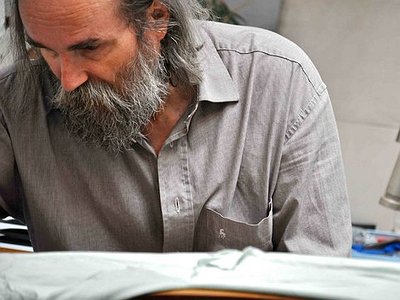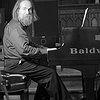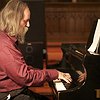Where the sound can live
Do you feel it important that an audience is able to deduct the processes and ideas behind a work purely on the basis of the music? If so, how do you make them transparent?
It’s important that the audience perceives the music for what it is but I don’t think it’s reasonable to expect everybody is going to perceive the music in the same way. After all, each person will hear the music slightly differently so his or her actual perceptions may vary greatly.
If you were asking, “can the audience perceive the experience of what it’s like to actually play the music?” I would say the answer is no in 99% of cases. There’s a big misunderstanding of what I’m doing technically at the piano with my fingers, my hands and my body but also with regards to what I am doing with my mind. My music is so different from any other piano music that has happened before that I feel I can safely say that people have no idea what's happening or what it’s like to play Continuous music.
It’s like turning your body into a jet or flying like a bird. Your flesh alters substance continuously and your mind is in hyper-speed as the world whirls around you like a hurricane with the piano as its vortex, yet you remain perfectly still.
All motion becomes non-motion. Space and time all become one solid entity and the mind plays like rain on the surface of the road. I don’t think people can comprehend what it’s like.
The relationship between music and other forms of art – such as painting, video art and cinema - has become increasingly important. How do you see this relationship yourself and in how far, do you feel, does music relate to other senses than hearing alone?
What a wonderful question. I do see the arts as interrelated. All have a deep effect on every artist. Art movements that have happened usually resonate into the musical world, but in most cases the musical world follows the visual arts by a few years.
When I was younger the visual arts were extremely important to my growth but what stumps me is, as far as Continuous Music is concerned, I cannot see any specific precursor to that in the visuals arts. It’s quite probable that Continuous music did not come into existence earlier purely because of the art scene and the mentality of humanity prior to the sixties.
How would you define the term “interpretation”? How important is it for you to closely work together with the artists performing your work?
A successful interpretation is when the musician or artist sees the unique beauty inherent in a piece of music and is able to extract that beauty through their performance or interpretation.
An incredible example of this would be film director Stanley Kubrick. He was the most magnificent genius of music I’ve ever seen because through his films, he would interpret a piece of music in a very specific way. I’m thinking of the music from Barry Lyndon.
You will never find a finer performance of Schubert’s ‘Death and the Maiden’ than you will on this soundtrack. If Schubert could have seen this film he would have cried and said “Thank you Stanley, you’re the first person who has ever really understood my music”.
Interpretation has to move your heart and it can only be right or wrong, even though what could be right can have many different faces. The composer sees something beautiful and then pours his heart and soul into a work to capture this beauty. He wants someone to see the same beauty that he has. So if you can see the beauty in the music, your interpretation will be right. You just have to keep your heart and soul open and be ready to laugh and cry.
I am yet to find anyone who can interpret my music at a level where I could say they are actually able to play the piece. None of my students are ready but when the time comes, their fingers will obey their minds and I will be able to gauge the success of their interpretation.
The effect of a piece doesn't merely depend on the performance of the musicians, but also on the place it is performed at. How do you see the relationship between location and sound? In how far do you feel the current system of concert halls is still the right one for your music – or for contemporary music in general?
Thank you. Wow, exactly. You’ve really hit one of the most important elements of Continuous Music with this question. Well, all music really. A concert hall is not the place, aurally, that my music works at its best. The best places for my music have been large or small churches, art galleries and factory venues. In all of these types of spaces there are resonances where the sound can live.
I know from people who play other solo instruments, that reverberant places are very important to the beauty of the sound. If the space is too dry, that’s worst of all.
It’s not just the aural experience of the space that can have an effect on people. The quality of the space can also enhance your mental awareness e.g. in an old factory, an art gallery or a church, where there is something else working on the mind of the listener other than the what’s happening aurally. All of these things affect the listener’s mind.
Continuous music really works best when the room sets the listener’s mind free. Concert halls are fairly restrictive so a different space allows people’s minds to roam free. It’s even better if people can lie down on the floor or walk around and choose different heights to listen from so that they can choose the sound that they want.
Like all existence, every point in space and time is unique. Wherever you are in a space, your sound and mental experience is going to vary greatly so the place is going to have a lot to do with whether or not your ears and mind will explode back into the room.
If you're just sitting in a little velvet seat, stuck in with 500 other people with bare walls on either side of you and one light on the stage in front of you, the music can be beautiful in that space but it becomes more meaningful and beautiful when it’s set free in a huge room with windows or a unique structure.
The role of the composer has always been subject to change. What's your view on the (e.g. political/social/creative) tasks of composers today and how do you try to meet these goals in your work?
From the time of Beethoven the element of mental change for the audience has been part of the scene. Prior to that, music was meant to conform and exist as an object of beauty. Beethoven broke that mould and said “Yes, I will create something magnificent and stunning for your soul and mind but I will also move you into totally new worlds”. From his time onwards, especially up until about 1910, you had composers really trying to move the boundaries of music and concept.
The great works have always been steadfast in their dedication to morality and truth and somehow these are the principles of music. In our time now, it’s an obligation to react and to make music politically important. After all, music is a statement of moral truth.
Everything that was true in music during the sixties or the beginning of the Age of Aquarius has been swept under the carpet and all because of the Orwellian society that we have started to live in. This is a society where human beings have no freedom at all and everyone is under surveillance everywhere they go. In a world where the president cannot open his mouth without lying and the truth is constantly hidden on a huge scale, the composer has a duty to speak about this with their art.
I’ve been working on an opera for a long time now that is about the escape from being a soldier and a life of constantly seeking after money and wealth because I feel that most of the ills of the world have been caused by soldiers. I find it mind-boggling how a human being can give his or her body and soul to someone and do whatever they're told.
To become a robot that does the bidding of another machine is a moral horror and there are thousands of men and women around the world who are willing to do anything for money. It’s so immoral. People are descending into a state of animalistic fear where our purpose in life is just to go to work and buy stuff.
Money is the killer of beauty. Our eyes are changed as soon as diamonds and guns become our main desire and it is also scientifically impossible to experience beauty and still be a soldier.
I would not have felt this 40 years ago. Maybe I was blind but it seems to me that our society is now faced with a catastrophic situation. As a composer, these things have to come out and so I’m hoping that my music, even though it doesn’t have any political structure or purpose, may move people’s minds and souls so that they will somehow grab a hold of themselves and start to see what the human being truly is. We are not creatures here to push buttons and kill people. This is not our purpose of existence.
Music is enemy of bullets so hopefully if people can learn to respond to the beauty of music, they’ll stop their madness.








